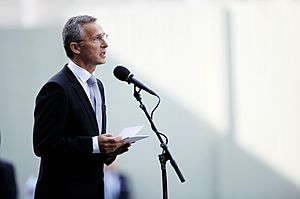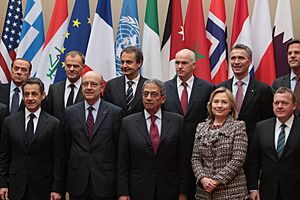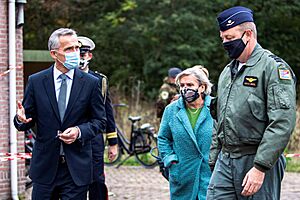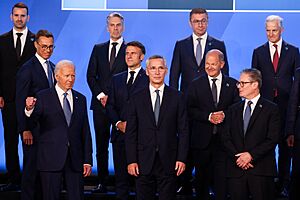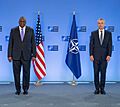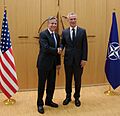Jens Stoltenberg facts for kids
Quick facts for kids
Jens Stoltenberg
|
|
|---|---|
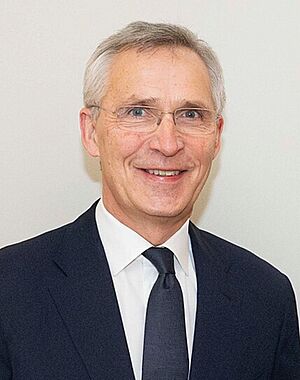
Stoltenberg in 2025
|
|
| Minister of Finance | |
| Assumed office 4 February 2025 |
|
| Prime Minister | Jonas Gahr Støre |
| Preceded by | Trygve Slagsvold Vedum |
| In office 25 October 1996 – 17 October 1997 |
|
| Prime Minister | Thorbjørn Jagland |
| Preceded by | Sigbjørn Johnsen |
| Succeeded by | Gudmund Restad |
| 13th Secretary General of NATO | |
| In office 1 October 2014 – 1 October 2024 |
|
| Deputy | Alexander Vershbow Rose Gottemoeller Mircea Geoană |
| Preceded by | Anders Fogh Rasmussen |
| Succeeded by | Mark Rutte |
| Prime Minister of Norway | |
| In office 17 October 2005 – 16 October 2013 |
|
| Monarch | Harald V |
| Preceded by | Kjell Magne Bondevik |
| Succeeded by | Erna Solberg |
| In office 17 March 2000 – 19 October 2001 |
|
| Monarch | Harald V |
| Preceded by | Kjell Magne Bondevik |
| Succeeded by | Kjell Magne Bondevik |
| Leader of the Opposition | |
| In office 16 October 2013 – 14 June 2014 |
|
| Prime Minister | Erna Solberg |
| Preceded by | Erna Solberg |
| Succeeded by | Jonas Gahr Støre |
| In office 19 October 2001 – 17 October 2005 |
|
| Prime Minister | Kjell Magne Bondevik |
| Succeeded by | Erna Solberg |
| Leader of the Labour Party | |
| In office 10 November 2002 – 14 June 2014 |
|
| Deputy | Hill-Marta Solberg Helga Pedersen |
| Preceded by | Thorbjørn Jagland |
| Succeeded by | Jonas Gahr Støre |
| Minister of Industry and Energy | |
| In office 7 October 1993 – 25 October 1996 |
|
| Prime Minister | Gro Harlem Brundtland |
| Preceded by | Finn Kristensen (as Minister of Industry) |
| Succeeded by | Grete Faremo (as Minister of Petroleum and Energy) |
| Member of the Norwegian Parliament | |
| In office 1 October 1993 – 30 September 2017 |
|
| Deputy | Anders Hornslien Inger Lise Husøy Ragnar Bøe Elgsaas Truls Wickholm Håkon Haugli |
| Constituency | Oslo |
| Personal details | |
| Born | 16 March 1959 Oslo, Norway |
| Political party | Labour |
| Spouse |
Ingrid Schulerud
(m. 1987) |
| Children | 2 |
| Parents | Karin Heiberg Thorvald Stoltenberg |
| Alma mater | University of Oslo (Cand.oecon.) |
| Awards | |
| Signature | |
| Website | |
| Military service | |
| Allegiance | |
| Branch/service | |
Jens Stoltenberg (born 16 March 1959) is a Norwegian politician. He has been the Minister of Finance since February 2025. He is a member of the Labour Party.
Before his current role, he was the prime minister of Norway twice. He served from 2000 to 2001 and again from 2005 to 2013. He also held a very important international job as secretary general of NATO from 2014 to 2024.
Stoltenberg was born in Oslo, Norway. His father, Thorvald Stoltenberg, was a diplomat and politician. His mother, Karin Stoltenberg, was also a politician and a geneticist. He studied economics at the University of Oslo. Before becoming a full-time politician, he worked as a journalist. He also led the Labour Party's youth group from 1985 to 1989.
He started his government career in 1990. He was elected to the Storting (Norwegian Parliament) in 1993. He served as a minister in different government departments. He was the leader of the Labour Party from 2002 to 2014.
People describe Stoltenberg as a careful politician. He is part of the more moderate side of social democracy. During his time as NATO Secretary General, he worked to make the alliance stronger. He also helped expand it into Eastern Europe.
Contents
Early Life and Education
Jens Stoltenberg was born on 16 March 1959 in Oslo, Norway. His family name comes from a place in Germany. His father, Thorvald Stoltenberg, was a Labour party politician and a diplomat. His mother, Karin Stoltenberg, was a geneticist and a government official.
Jens lived in Yugoslavia from 1961 to 1964. This was because his father worked at the Norwegian embassy there. He went to primary school at Oslo Waldorf School. He then attended Oslo Cathedral School for upper secondary school.
After school, he completed his mandatory military service. He served with the Army's Infantry Training Centre. Later, he went to the University of Oslo. He graduated in 1987 with a degree in economics. His thesis was about economic planning.
Stoltenberg became interested in politics when he was a teenager. He was influenced by his older sister, Camilla. He was motivated by his opposition to the Vietnam War. He took part in protest rallies against the United States Embassy in Oslo.
Early Career
From 1979 to 1981, Stoltenberg worked as a journalist for a newspaper called Arbeiderbladet. He then became the leader of the Workers' Youth League. He held this position from 1985 to 1989.
After that, from 1989 to 1990, he worked for Statistics Norway. This is Norway's main office for official statistics. He also taught part-time at the University of Oslo. Between 1990 and 1992, he led the Labour Party's chapter in Oslo.
First Steps in Norwegian Politics (1990–2013)
Stoltenberg began his government career as a state secretary. He worked in the Ministry of the Environment from 1990 to 1991. In 1993, he was elected to the Parliament for the Oslo area. He was a member of the Labour Party.
He served as the Minister of Industry from 1993 to 1996. This was under Prime Minister Gro Harlem Brundtland.
Minister of Finance (1996–1997)
In 1996, Thorbjørn Jagland became prime minister. Stoltenberg was then appointed Minister of Finance. In September 1997, Jagland resigned. This happened because his party did not get enough votes in an election.
After Jagland's resignation, Stoltenberg worked in Parliament. He focused on oil and energy issues. He became the Labour Party's candidate for prime minister in February 2000.
First Term as Prime Minister (2000–2001)
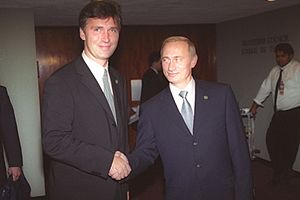
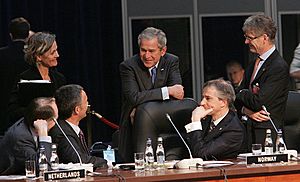
In 2000, the government led by Kjell Magne Bondevik resigned. Jens Stoltenberg then became prime minister. His first government was in power from March 2000 to October 2001. During this time, he introduced some reforms. These changes aimed to modernize Norway's welfare system. They also involved partly privatizing some state-owned services.
In the 2001 parliamentary election, the Labour Party had a very poor result. They won only 24% of the votes. This was one of their worst results ever. Because of this, Stoltenberg and his government had to resign.
Some people believe the party lost because they focused too much on starting reforms. They did not explain enough why these changes were needed. These reforms included selling parts of state-owned companies. They also reorganized healthcare and public hospitals.
Becoming Party Leader
After the bad election result in 2001, there was a leadership contest. This was between Jagland and Stoltenberg. In November 2002, Stoltenberg was chosen as the new leader of the Labour Party. Everyone agreed on this decision.
Second Term as Prime Minister (2005–2013)
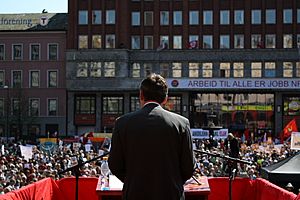
In the 2005 parliamentary election, the Labour Party did much better. They formed a government with the Socialist Left Party and the Centre Party. This was called the Red-Green Coalition. Stoltenberg's second government was in power from October 2005 to October 2013.
During this time, they discussed important issues. These included Norway's military involvement in Afghanistan. They also talked about oil activities in the Barents Sea. Other topics were LGBT rights, immigration, and education.
After being re-elected in 2009, Stoltenberg worked on Norway's response to the global economic downturn. He also supported environmental policies. These policies involved taxes for private citizens and companies.
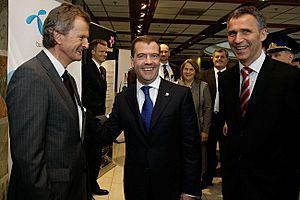
A long-standing disagreement with Russia over a sea border was settled. Stoltenberg and Russian President Dimitry Medvedev signed an agreement in 2010. This agreement divided a large disputed area into two equal parts.
As Prime Minister, Stoltenberg aimed for a good relationship with Russia. He believed in talking and working together. He also stressed the importance of security near NATO countries.
2011 Terrorist Attacks
On 22 July 2011, Norway experienced two terrible attacks. A bomb exploded in Oslo near the prime minister's office. Eight people died. About an hour later, a person shot and killed 67 people. This happened at Utøya, an island where the Labour Party's youth camp was held. Stoltenberg was at his home preparing a speech when the Oslo explosion happened.
After the attacks, Stoltenberg spoke at the Oslo Cathedral. He promised to work for more democracy, openness, and kindness. He quoted a young person from the youth camp who said: "If one man can show so much hate, think how much love we could show, standing together."
In 2012, the person responsible for the attacks was found guilty. He received the maximum penalty in Norway. A report later criticized the government's preparedness for the attacks. Stoltenberg said he had "ultimate responsibility" but would not resign.
2013 Election and Defeat
Stoltenberg ran for re-election in 2013. He hoped for a third term as prime minister. However, his coalition did not win enough votes to form a majority government. The Labour Party remained the largest party.
After the election, Erna Solberg formed a new government. Stoltenberg returned to Parliament as the leader of the opposition. In December 2013, the United Nations appointed him as a special envoy. His role was to work on climate change.
Policies as Prime Minister
Stoltenberg is known as a careful politician. He belongs to the moderate side of social democracy. When he first became prime minister in 2000, his policies were inspired by the "New Labour" ideas in the UK. After the 2001 election loss, he worked more closely with trade unions.
In terms of defense, Stoltenberg supported increasing military spending. He also believed in dialogue.
Defense and Foreign Policy
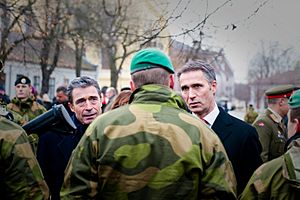
During Stoltenberg's time as prime minister, Norway's defense spending grew. Norway now has one of the highest defense spending per person among NATO allies. He also helped modernize Norway's armed forces. He contributed forces to various NATO operations.
Stoltenberg supports strong cooperation with the United States. He has always supported Norway joining the European Union.
He has criticized Israel's actions in the Palestinian Territories. In 2006, he said that Norway condemned Israel's actions. He called them "totally unacceptable."
Financial Crisis
Stoltenberg played an international role during the global financial crisis. He promoted cooperation between countries on financial matters. He worked with organizations like the International Monetary Fund (IMF). He also met with other world leaders to discuss solutions.
He emphasized the high unemployment caused by the crisis. He called for better international coordination. He also pushed for investments to encourage new ideas. Norway managed to have one of the lowest unemployment rates in Europe during the crisis.
Environment and Climate Change
Stoltenberg's government worked to preserve rainforests in tropical countries. This helps to reduce greenhouse gas emissions. In 2007, the government received support to fund forest conservation.
He believed that international agreements with global taxes or limits were the best way to reduce emissions. At the UN Climate Change Conference 2009, he proposed funding for rainforest preservation. This idea gained support from leaders like U.S. President Barack Obama.
In January 2014, Jens Stoltenberg became a United Nations Special Envoy on Climate Change. He met with top UN officials to discuss climate action.
Vaccines
Stoltenberg has strongly supported vaccinating all children worldwide. He believes this helps fight infectious diseases. He was on the board of the Global Alliance for Vaccines and Immunization (GAVI) from 2002 to 2005. He received an award for his work in children's health.
He was a key person behind an international effort. This effort raised over $3.7 billion to help GAVI reduce child deaths. He stressed that this would save millions of children from common childhood illnesses. In his 2013 New Year speech, he called child vaccination a "miracle of our time."
United Nations Special Envoy (2013–2014)
In 2011, Stoltenberg received an award from the United Nations Foundation. This was for his efforts to meet global development goals. In 2013, he served as a UN special envoy on climate change. He also led groups focused on climate change financing.
NATO Secretary General (2014–2024)
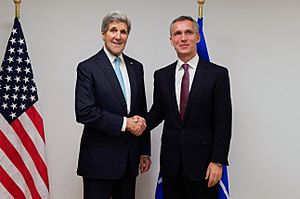
On 28 March 2014, NATO chose Stoltenberg as its next Secretary General. He took office on 1 October 2014. He was the 13th person to hold this position. Many people expected his appointment. Experts said that NATO's relationship with Russia would be his biggest challenge.
Stoltenberg was the first Norwegian to serve as NATO Secretary General. Norway was one of the founding members of NATO in 1949.
Key Events and Policies
In June 2015, Stoltenberg stated that NATO did not see an immediate threat from the east. He said their goal was still cooperation with Russia.
In 2016, Stoltenberg strongly condemned a coup attempt in Turkey. He fully supported the Turkish government. He also noted that some Turkish officers working for NATO had asked for asylum.
He emphasized the importance of working with Israel. He said Israel had been an active partner for 20 years. He also stated that NATO supported the UN's efforts to find a solution to the dispute over northern Cyprus.
The presidency of Donald Trump was a big challenge for NATO. Trump had threatened to leave NATO. A study in 2021 suggested that Stoltenberg played a key role in keeping NATO strong during this time.
In August 2017, Stoltenberg visited NATO units in Estonia. He warned that Russia had used large military exercises as a way to prepare for aggressive actions against its neighbors.
In January 2018, Turkey invaded northern Syria. Stoltenberg said Turkey had "legitimate security concerns." But he stressed that their actions should be "proportionate and measured."
In February 2018, Stoltenberg said NATO did not see any threat from Russia against its allies. He welcomed a meeting between Vladimir Putin and Donald Trump. He said NATO was not trying to isolate Russia.
At the July 2018 Brussels Summit, NATO decided to improve its defense readiness. By 2020, they aimed to have 30 battalions, 30 air squadrons, and 30 naval vessels ready within 30 days.
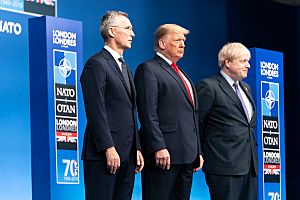
In March 2019, Stoltenberg said that Georgia would become a member of NATO. In April 2019, he warned the U.S. Congress about the threat from Russia. He also praised Turkey's contributions to NATO.
In August 2019, Stoltenberg warned that NATO needed to address the rise of China. He urged cooperation with countries like Australia, Japan, and South Korea. In June 2020, he called on like-minded nations to stand up to China's "bullying."
He condemned an attack on Saudi Arabia's oil facilities in October 2019. He accused Iran of supporting terrorist groups. In December 2019, he noted that Canada and European allies had added billions to their defense budgets.
In January 2020, after a U.S. airstrike killed an Iranian general, Stoltenberg said NATO members supported the United States. He urged Iran to avoid further violence.
In February 2020, he spoke at the Munich Security Conference. He discussed the need for European allies to contribute more to defense. He also mentioned the situation in Afghanistan. He warned against trading short-term economic benefits for long-term security challenges.
In August 2020, a dispute arose between Turkey and Greece. Stoltenberg said both were valued allies. He welcomed their bilateral talks to resolve differences. In October 2020, he called for an end to fighting in the Nagorno-Karabakh region.
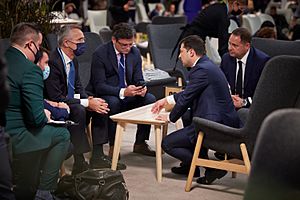
In April 2021, Stoltenberg urged Russia to stop building up forces near Ukraine. He also announced that NATO would withdraw its troops from Afghanistan by May 1. He later said the speed of the Afghan government's collapse was a surprise.
He attended the 2021 UN Climate Change Conference. He said the military could help fight climate change.
In November 2021, Russian President Vladimir Putin stated that NATO's expansion in Ukraine was a "red line." Stoltenberg replied that only Ukraine and NATO allies decide when Ukraine is ready to join. He said Russia had no right to control its neighbors.
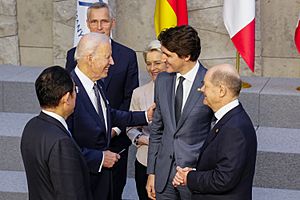
In January 2022, Stoltenberg condemned a cyberattack on Ukraine. He said NATO experts were helping Ukrainian authorities. In February 2022, he stated that Russia's military buildup continued despite diplomatic efforts. He condemned Russia's recognition of separatist regions in Donbas.
In March 2022, Stoltenberg said NATO would not create a no-fly zone over Ukraine. He stressed that NATO was not part of the conflict. He warned that any attack on a NATO country would trigger Article 5. He also accused China of supporting Russia's invasion.
NATO announced the creation of four more multinational battlegroups in March 2022. This brought the total to eight battlegroups along NATO's eastern border.
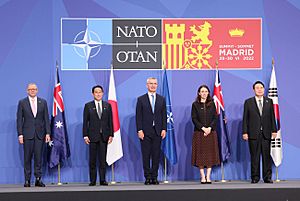
In May 2022, Stoltenberg said Finland and Sweden would be welcomed into NATO. However, Turkish President Recep Tayyip Erdoğan opposed their membership. He accused them of tolerating Kurdish groups Turkey considers terrorists. Stoltenberg said Turkey had "legitimate concerns."
In June 2022, Stoltenberg warned that the war in Ukraine could last for years. He urged continued support for Ukraine. In November 2022, he met with leaders from Moldova, Bosnia, and Georgia. He stressed the importance of supporting them against Russian pressure.
In December 2022, he said a full-scale war between Russia and NATO was a "possibility." He believed Putin was planning a long war in Ukraine.
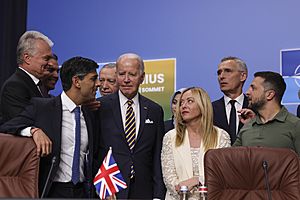
In February 2023, Stoltenberg commented on a Chinese balloon incident. He said it showed China's investment in surveillance. He also said that Russia was sending many troops to Ukraine. He stressed the need for NATO countries to keep providing military aid to Ukraine.
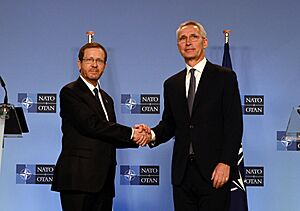
In June 2023, Stoltenberg supported Ukraine's counter-offensive. He called on Western countries to send more weapons. In July 2023, his term as NATO Secretary General was extended until October 2024. This made his time in office at least ten years long.
In September 2023, Stoltenberg warned that the war in Ukraine could be long. He said Ukraine would no longer exist if it stopped fighting. In October 2023, he condemned Hamas' actions in the Gaza war. He supported Israel's right to self-defense. He also warned Iran and Hezbollah not to get involved.
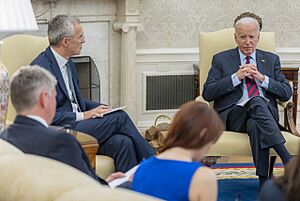
In February 2024, Stoltenberg warned that NATO members should prepare for a long confrontation with Russia. He said increasing arms supplies to Ukraine and strengthening NATO's military were the best defenses. He also criticized Donald Trump's comments about NATO members not paying their "fair share."
In May 2024, Stoltenberg called for Ukraine to be allowed to use Western weapons to strike targets inside Russia. However, Italy's Defence Minister disagreed. He said it was "wrong to increase tension."
Stoltenberg also commented on China's military aid to Russia. He said Russia could not fight the war without China's support. He warned that China could not have normal trade with Europe while fueling the war.
On 9 July 2024, Stoltenberg received the Presidential Medal of Freedom. This is the highest civilian honor in the United States. President Joe Biden gave him the award for his service to NATO during the war in Ukraine. On 30 July 2024, King Felipe VI of Spain also honored him.
In September 2024, Stoltenberg said he regretted that NATO did not do more to strengthen Ukraine before Russia's invasion. He believed that a stronger Ukraine might have prevented the attack.
On 18 June 2024, it was announced that Mark Rutte would succeed Stoltenberg as Secretary General. Rutte officially took over on 1 October 2024.
Nomination for Central Bank Governor
In December 2021, it was reported that Stoltenberg was interested in becoming the governor of Norges Bank. This is Norway's central bank. He confirmed his application on 14 December. He said he could not start the job until his NATO term ended in October 2022.
His possible appointment caused some debate. This was due to his ties to the Labour Party and his friendship with Prime Minister Jonas Gahr Støre. People worried about the central bank's independence.
His appointment was officially announced on 4 February 2022. However, after a NATO summit in March 2022, Stoltenberg accepted another year as NATO Secretary General. He then withdrew from the central bank role.
Post-NATO Career
Munich Security Conference
On 8 October 2024, it was announced that Stoltenberg would become the next Chairman of the Munich Security Conference (MSC). He will start this role in February 2025.
Bilderberg Group
On 8 November 2024, Stoltenberg was appointed Chairman of the Steering Committee of the Bilderberg Group. This is a private conference where political leaders and experts discuss global issues. His appointment gives him a key role in the group's decisions.
Views on Ukraine (December 2024)
In December 2024, Stoltenberg supported Ukraine joining NATO faster. He said that Ukraine would need to control all its territory up to a certain border for NATO's Article 5 to apply. He also suggested that Ukraine might temporarily give up some Russian-occupied territories for peace.
Minister of Finance (2025–present)
On 4 February 2025, Jens Stoltenberg became Norway's Minister of Finance. He took over from Trygve Slagsvold Vedum. This happened after a government coalition ended. Stoltenberg resigned from his role at the Munich Security Conference to focus on his new job. He also stepped down from the Bilderberg Group.
A week into his new role, Stoltenberg attended the 61st Munich Security Conference. He warned the United States against not including Ukraine in peace talks with Russia.
In March 2025, Stoltenberg tried to find a compromise on tax changes. Most opposition parties rejected his idea. However, he remained hopeful. He mentioned the global situation and the need to change the tax system.
In April 2025, Stoltenberg went with Prime Minister Jonas Gahr Støre to Washington, D.C. They met with US President Donald Trump. They discussed relations between the US and Norway. They also talked about the war in Ukraine and Norway's role in the Arctic.
Honours and Medals
National Honours
 Norway: King Harald V's Jubilee Medal 1991–2016 (2016)
Norway: King Harald V's Jubilee Medal 1991–2016 (2016)
Foreign Honours
 Belgium: Grand Cordon of the Order of Leopold (2024)
Belgium: Grand Cordon of the Order of Leopold (2024) Czech Republic: Member 3rd Class of the Order of Tomáš Garrigue Masaryk (2024)
Czech Republic: Member 3rd Class of the Order of Tomáš Garrigue Masaryk (2024) Estonia:
Estonia:
- Member 1st Class of the Order of the Cross of Terra Mariana (2019)
- Cross of Merit, 1st Class, Ministry of Foreign Affairs (2024)
 Finland: Grand Cross of the Order of the Lion of Finland (2024)
Finland: Grand Cross of the Order of the Lion of Finland (2024) Germany: Grand Cross 1st Class of the Order of Merit of the Federal Republic of Germany (2024)
Germany: Grand Cross 1st Class of the Order of Merit of the Federal Republic of Germany (2024) Japan: Grand Cordon of the Order of the Rising Sun (2025)
Japan: Grand Cordon of the Order of the Rising Sun (2025) Latvia: Member 1st Class of the Order of the Three Stars (2024)
Latvia: Member 1st Class of the Order of the Three Stars (2024) Lithuania:
Lithuania:
- Grand Cross of the Order of Vytautas the Great (2019)
- Grand Cross of the Order of the Cross of Vytis (2023)
 Montenegro: Member 2nd Class of the Order of the Republic of Montenegro (2017)
Montenegro: Member 2nd Class of the Order of the Republic of Montenegro (2017) Netherlands: Knight Grand Cross of the Order of Orange-Nassau (2024)
Netherlands: Knight Grand Cross of the Order of Orange-Nassau (2024) Ukraine: Member 1st Class of the Order of Prince Yaroslav the Wise (2023)
Ukraine: Member 1st Class of the Order of Prince Yaroslav the Wise (2023) United States of America:
United States of America:
- Presidential Medal of Freedom (2024)
- Department of Defense Medal for Distinguished Public Service (2024)
 Spain: Knight Grand Cross of the Order of Isabella the Catholic (2024)
Spain: Knight Grand Cross of the Order of Isabella the Catholic (2024) Sweden: Commander Grand Cross of the Order of the Polar Star (2024)
Sweden: Commander Grand Cross of the Order of the Polar Star (2024)
Personal Life
Jens Stoltenberg is married to Ingrid Schulerud, who is a diplomat. They have two children. Their son, Axel, was born in 1989. Their daughter, Anne Catharina, was born in 1992. Anne Catharina is part of a music group called Smerz.
Jens has one living sister, Camilla Stoltenberg, who is a medical researcher. His other sister, Nini, passed away in 2014.
He enjoys spending his summer holidays at his family's cottage. This cottage is on the Hvaler Islands. He loves being outdoors. He often rides his bike and enjoys cross-country skiing in winter. In December 2011, he traveled to Antarctica. This was to mark 100 years since Roald Amundsen reached the South Pole.
Although he was often seen as an atheist, Stoltenberg has said he does not consider himself one. He explained that he believes "there is something greater than man." He finds this feeling in a church.
Images for kids
-
Stoltenberg with UK Defence Secretary Michael Fallon, US Defense Secretary Ash Carter, and German Defence Minister Ursula von der Leyen in Brussels, October 2015
-
Stoltenberg and Polish Prime Minister Beata Szydło in Warsaw, 31 May 2016
-
Stoltenberg and Armenian President Serzh Sargsyan in Brussels, 27 February 2017
-
Stoltenberg and Ukrainian President Petro Poroshenko in Kyiv, 10 July 2017
-
Stoltenberg and Azerbaijani President Ilham Aliyev in Brussels, 23 November 2017
-
Stoltenberg and U.S. Secretary of Defense Jim Mattis in Brussels, 7 June 2018
-
Stoltenberg with Afghan President Ashraf Ghani in Kabul, Afghanistan, February 2020
-
Stoltenberg with U.S. Defense Secretary Mark Esper in Brussels, 12 February 2020
-
Stoltenberg with Japanese Defense Minister Taro Kono at the 56th Munich Security Conference in February 2020
-
Stoltenberg and U.S. Secretary of Defense Lloyd Austin in Brussels, 14 April 2021
-
Stoltenberg and Spanish Prime Minister Pedro Sánchez in Madrid, 8 October 2021
-
Stoltenberg and Finnish Prime Minister Sanna Marin in Helsinki, 25 October 2021
-
Stoltenberg and US Defense Secretary Lloyd Austin at The Pentagon on 2 June 2022
-
Stoltenberg and U.S. Secretary of State Antony Blinken in Brussels, 9 September 2022
-
Stoltenberg and Israeli President Isaac Herzog in Brussels, 26 January 2023
-
Stoltenberg and President of the European Council Charles Michel in Brussels, 29 June 2023
-
Stoltenberg with US Secretary of State Antony Blinken in Washington, D.C., 29 January 2024
See also
 In Spanish: Jens Stoltenberg para niños
In Spanish: Jens Stoltenberg para niños
 | Valerie Thomas |
 | Frederick McKinley Jones |
 | George Edward Alcorn Jr. |
 | Thomas Mensah |


